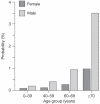Bladder cancer in the elderly: clinical outcomes, basic mechanisms, and future research direction - PubMed (original) (raw)
Review
Bladder cancer in the elderly: clinical outcomes, basic mechanisms, and future research direction
John A Taylor 3rd et al. Nat Clin Pract Urol. 2009 Mar.
Abstract
The association between aging and cancer is well exemplified by bladder cancer: with advancing age, the risk of developing bladder cancer increases, and patients' clinical presentation and outcomes worsen. Care for elderly patients with bladder cancer requires specific knowledge of many key geriatric clinical issues in order to determine optimal treatment plans. While numerous studies have tried to address the role of urologic intervention for elderly patients with bladder cancer, many studies fail to incorporate a component of true functional assessment. Evaluation tools that incorporate comorbidities, disabilities and functional status will need to be developed, as chronological age is a poor predictor of treatment outcomes. Additionally, further research is necessary to better understand the basic mechanisms that predispose elderly patients to develop this costly and life-threatening disease. This Review examines the current literature evaluating the clinical and mechanistic interactions between aging and bladder cancer, and suggests the formulation of a research agenda to address the issues raised.
Figures
Figure 1
The number of new bladder cancer cases by year in the US (based on data from the American Cancer Society Cancer Facts & Figures 2002–2008).
Figure 2
The probability of developing invasive bladder cancer by age group (based on data from the American Cancer Society Facts & Figures 2008).
Similar articles
- Curative Treatment for Muscle Invasive Bladder Cancer in Elderly Patients: A Systematic Review.
Fonteyne V, Ost P, Bellmunt J, Droz JP, Mongiat-Artus P, Inman B, Paillaud E, Saad F, Ploussard G. Fonteyne V, et al. Eur Urol. 2018 Jan;73(1):40-50. doi: 10.1016/j.eururo.2017.03.019. Epub 2017 May 3. Eur Urol. 2018. PMID: 28478043 Review. - Treatment of bladder cancer in the elderly.
Erlich A, Zlotta AR. Erlich A, et al. Investig Clin Urol. 2016 Jun;57 Suppl 1(Suppl 1):S26-35. doi: 10.4111/icu.2016.57.S1.S26. Epub 2016 May 27. Investig Clin Urol. 2016. PMID: 27326404 Free PMC article. Review. - Managing muscle-invasive bladder cancer in the elderly.
Weizer AZ, Palella GV, Montgomery JS. Weizer AZ, et al. Expert Rev Anticancer Ther. 2010 Jun;10(6):903-15. doi: 10.1586/era.10.71. Expert Rev Anticancer Ther. 2010. PMID: 20553214 Review. - Performance status is a predictor of overall survival of elderly patients with muscle invasive bladder cancer.
Weizer AZ, Joshi D, Daignault S, Kinnaman M, Hussain M, Montie JE, Zhang Y, Lee CT. Weizer AZ, et al. J Urol. 2007 Apr;177(4):1287-93. doi: 10.1016/j.juro.2006.11.060. J Urol. 2007. PMID: 17382715 - Management of advanced bladder cancer in the elderly.
Raghavan D. Raghavan D. Urol Clin North Am. 1992 Nov;19(4):797-806. Urol Clin North Am. 1992. PMID: 1441033 Review.
Cited by
- Development and Optimization of a Bladder Cancer Algorithm Using SEER-Medicare Claims Data.
Gore JL, Wright P, Shih V, Chang NN, Noshad S, Rey GG, Wang S, Narayanan S. Gore JL, et al. JCO Clin Cancer Inform. 2024 Sep;8:e2400073. doi: 10.1200/CCI.24.00073. JCO Clin Cancer Inform. 2024. PMID: 39298694 Free PMC article. - Comparison of long-term outcomes between ileal conduit and transuretero-cutaneostomy urinary diversion after radical cystectomy: a systematic review and meta-analysis.
Nabil RA, Warli SM, Siregar GP, Prapiska FF. Nabil RA, et al. Rep Pract Oncol Radiother. 2024 Mar 18;29(1):103-112. doi: 10.5603/rpor.99098. eCollection 2024. Rep Pract Oncol Radiother. 2024. PMID: 39165596 Free PMC article. - Chemokine receptor 7 contributes to T- and B-cell filtering in ageing bladder, cystitis and bladder cancer.
Zhao J, Luo X, Yang C, Yang X, Deng M, Sun B, Zhu J, Dong Z, Wang Y, Li J, Yang X, Li B, Wang X, Zheng J. Zhao J, et al. Immun Ageing. 2024 May 18;21(1):33. doi: 10.1186/s12979-024-00432-5. Immun Ageing. 2024. PMID: 38762550 Free PMC article. - Aging induces changes in cancer formation and microbial content in a murine model of bladder cancer.
Woolbright BL, Xuan H, Ahmed I, Rajendran G, Abbott E, Dennis K, Zhong C, Umar S, Taylor JA 3rd. Woolbright BL, et al. Geroscience. 2024 Jun;46(3):3361-3375. doi: 10.1007/s11357-024-01064-9. Epub 2024 Jan 25. Geroscience. 2024. PMID: 38270807 Free PMC article. - Genome-Scale Methylation Analysis Identifies Immune Profiles and Age Acceleration Associations with Bladder Cancer Outcomes.
Chen JQ, Salas LA, Wiencke JK, Koestler DC, Molinaro AM, Andrew AS, Seigne JD, Karagas MR, Kelsey KT, Christensen BC. Chen JQ, et al. Cancer Epidemiol Biomarkers Prev. 2023 Oct 2;32(10):1328-1337. doi: 10.1158/1055-9965.EPI-23-0331. Cancer Epidemiol Biomarkers Prev. 2023. PMID: 37527159 Free PMC article.
References
- Edwards BK, et al. Annual report to the nation on the status of cancer, 1973–1999, featuring implications of age and aging on US cancer burden. Cancer. 2002;94:2766–2792. - PubMed
- Serrano M, Blasco MA. Cancer and ageing: convergent and divergent mechanisms. Nat Rev Mol Cell Biol. 2007;8:715–722. - PubMed
- Lichtman SM, et al. Geriatric oncology: a field coming of age. J Clin Oncol. 2007;25:1821–1823. - PubMed
- Lynch CF, Cohen MB. Urinary system. Cancer. 1995;75:316–329. - PubMed
- American Cancer Society Cancer Facts & Figures 2008. [accessed 21 January 2009]. 2008. online. [ http://www.cancer.org/downloads/STT/2008CAFFfinalsecured.pdf]
Publication types
MeSH terms
Grants and funding
- R01 AG028657/AG/NIA NIH HHS/United States
- R01 AG028657-01A1/AG/NIA NIH HHS/United States
- R01 AG028657-02/AG/NIA NIH HHS/United States
- R01-AG028657/AG/NIA NIH HHS/United States
LinkOut - more resources
Full Text Sources
Medical

